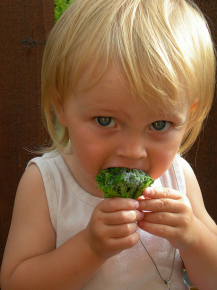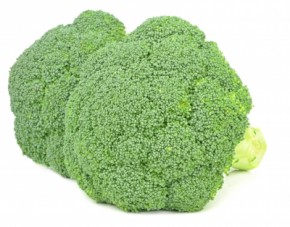The reality is that there are some foods that we don’t really enjoy eating, but we eat them because we know they’re good for us. For my lovely colleague Dr Irwin Lim, broccoli is one of these foods. He recently asked me to write a blog to help convince him to eat broccoli... So here goes!
 Thanks to scopeblog.stanford.edu for the photo via http://www.flickr.com/photos/lindaaslund/2384113340/
Thanks to scopeblog.stanford.edu for the photo via http://www.flickr.com/photos/lindaaslund/2384113340/B is for B vitamins. Broccoli is a great source of vitamins B1 (thiamin), 2 (riboflavin), 3 (niacin), 6 and 12. These vitamins are essential parts of metabolic pathways in the body so that the body is able to function properly.
R is for Red Blood Cells. Red blood cells transport iron around the body whilst it is attached to haemoglobin, thus delivering oxygen to cells. Furthermore, iron is required to make new red blood cells. Broccoli happens to be a good source of non-haem iron.
O is for Osteoporosis. Broccoli has one of the highest calcium contents of vegetables, so is a fantastic choice for ensuring you have strong bones. It is also very high in vitamin K. Vitamin K can increase bone mineral density and reduce fracture rates in osteoporotic people. Furthermore, there is evidence in human intervention studies that vitamins K and D work together to improve bone density.
C is for Cancer Prevention. Broccoli has shown in numerous studies to contain nutrients which assist with preventing or reducing the risk of cancer, in particular prostate and colorectal cancer.
C is for Cholesterol Reduction. Broccoli is a great source of fibre, which binds to bile acids prior to excretion, thus reducing cholesterol levels.
O is for Oxidation.Broccoli contains many nutrients which help prevent oxidative damage occurring within the body. Antioxidants help prevent damage caused by free radicals, which can play a role in the development of some diseases and cancers. Antioxidants found in broccoli include vitamins A, E and in particular vitamin C. Vitamin C also assists with transporting iron around the body, is regularly used in treatment of colds and flu, assists with wound healing and may be involved with bone health.
L is for lutein. Lutein and betacarotene are part of the carotenoid family, or what we call ‘Vitamin A equivalents’, of which broccoli is high in both. These are in particularly beneficial for healthy eye sight.
I is for Incredible! Which you surely must think Broccoli is now you have read this!


